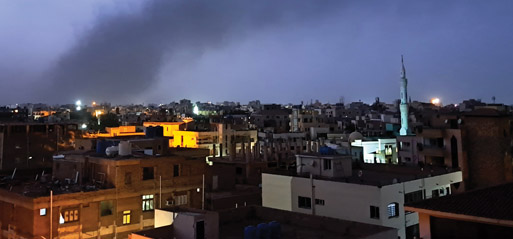
Smoke rises during clashes between the Sudanese Armed Forces and the paramilitary Rapid Support Forces (RSF) despite the ceasefire in Khartoum, Sudan on April 28 (Credit: Ahmed Satti/Anadolu Agency)
Mia Jin Haagensli
On April 15, intense clashes broke out in Sudan. After months of tension and power struggle, the Sudanese military and the country’s powerful paramilitary group the Rapid Support Forces (RSF) came head-to-head, resulting in a humanitarian crisis.
The clashes between the military, with General Abdel Fattah al-Burhan and the RSF, under General Mohamed Hamdan Dagalo, also known as Hemedti, have forced thousands of Sudanese to flee the country. According to the UN, roughly 270,000 citizens are expected to leave Sudan in the nearest future, triggering a new migration wave. Facing this reality, Sudanese refugees are dependent on support and help from other countries – a responsibility Britain seems to neglect.
In an interview with BBC, Home Secretary, Suella Braverman, said that the British government will focus on helping ‘British nationals. This is a stark contrast to the many programmes announced in support of Ukrainian refugees.
When asked if Britain will create safe, legal routes from Sudan to the UK, the same way they did following the war in Ukraine, Braverman stated that “we have no plans to do that”, emphasizing that the focus of the government will be “helping British nationals” as “that’s our duty, that’s our priority”.
Braverman has made headlines in the past regarding her controversial views on boat refugees, labelling them criminals.
She claimed criminality was “very closely linked” to their arrival, telling Sky News: “We see that there are many people coming here illegally who are then getting involved in drugs, who are getting involved in violent crime, who are getting involved in prostitution.
“All of that is at odds with British values, all of that is unacceptable behaviour.”
Both Braverman and immigration minister Robert Jenrick claimed that the Sudanese should apply through the United Nations High Commissioner for Refugees (UNHCR).
Braverman told Sky News: “The UNHCR is present in the region, and they are the right mechanism by which people should apply if they do want to seek asylum in the United Kingdom”.
On the same day, Jenrick told the Parliament: “The best advice clearly would be for individuals to present to the UNHCR.”
However, following these comments, the UNHCR issued a statement stating that “there is no mechanism through which refugees can approach UNHCR with the intention of seeking asylum in the UK”.
However, these views of the UK Government on Sudanese refugees are a stark contrast to the support offered by the UK in the wake of the war in Ukraine. Whereas various safe, legal routes from Ukraine to the UK were offered, there is none for Sudanese refugees.
As of August 2022, over 115,000 Ukrainians had arrived in the UK following the war. Britain was quick to offer its support to Ukraine and its citizens with Deputy Ambassador Brown saying that “we will support a better future for Ukraine”, and “they will see a brighter future”.
Asked by the SNP’s Westminster Leader, Stephen Flynn, at Prime Minister’s Question time, what safe and legal route would be available to a child refugee seeking to flee Sudan, Prime Minister, Rishi Sunak, said the government’s “reasonable, legal and fair” priority had been to evacuate UK nationals.
“We need some more humanity in this debate”, Flynn responded, asking if the PM would detain a child refugee from Sudan. Sunak said the government had spent £250m on aid to Sudan in the past five years.
Dr. Ashraf Abdelfatah, a long-standing, respected member of the Sudanese community in the UK as well as the grandson of the first President of the Sovereign Council of Sudan, told Refugee Support Group that he wishes to see the UK government “deploy a similar plan to the one they used for Ukraine […] to those who have been affected by the conflict in Sudan”.
READ MORE
Editorial: Sudanese crises another reminder of UK’s double standard laden Home Office